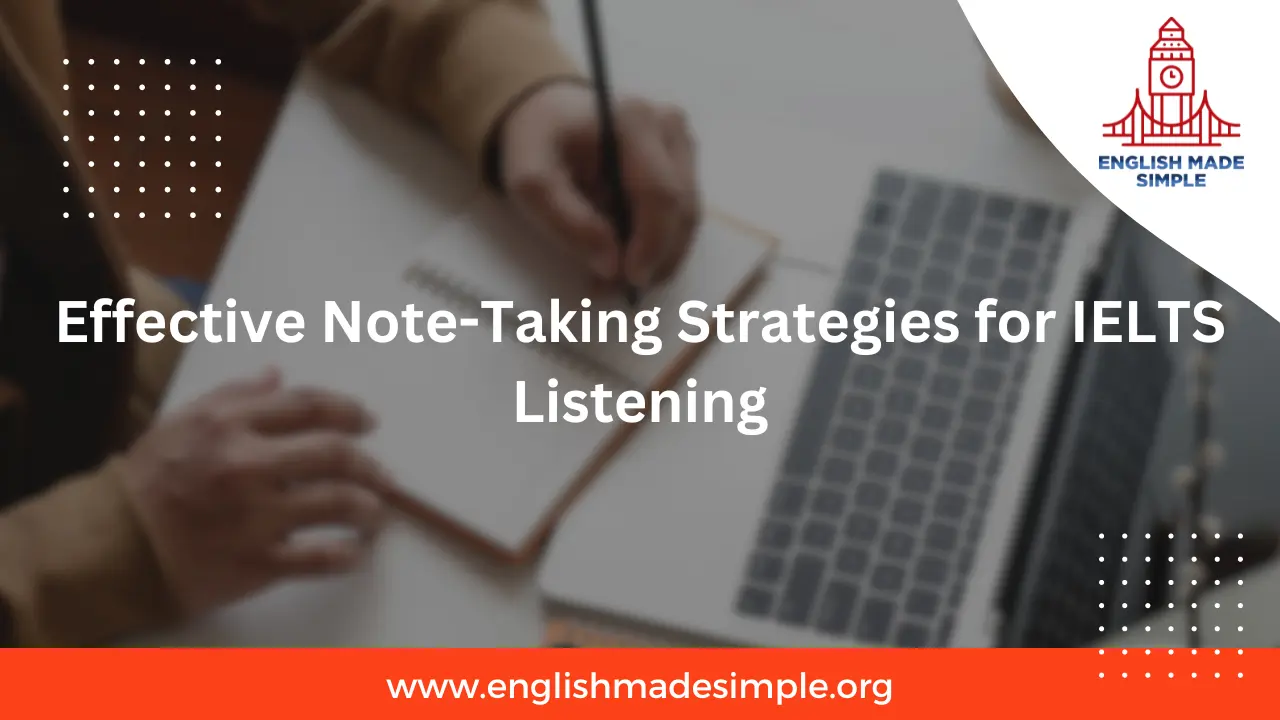
Effective Note-Taking Strategies for IELTS Listening
Note-taking is a crucial skill for the IELTS Listening test, where you must listen to recordings and answer questions based on what you hear. Effective note-taking helps you capture important details and stay focused throughout the test. In this blog, we’ll explore effective note-taking strategies to improve your performance in IELTS Listening.
Why Note-Taking is Important
- Capture Key Information: Helps you remember and record essential details from the listening passage.
- Stay Focused: Keeps you engaged and attentive to the recording.
- Organize Thoughts: Aids in structuring your answers and identifying the correct responses.
Note-Taking Strategies
1. Understand the Test Format
Before practicing note-taking, familiarize yourself with the IELTS Listening test format:
- Four Sections: Each section has a different type of recording and questions (e.g., conversations, monologues, discussions).
- Different Question Types: Includes multiple-choice, fill-in-the-blanks, matching, and more.
- Instructions and Time: Pay attention to instructions and the time you have to answer each question.
2. Develop a Note-Taking System
Create a note-taking system that works for you. This may include:
- Abbreviations and Symbols: Use common abbreviations and symbols to write faster (e.g., “w/” for “with,” “govt” for “government”).
- Short Forms: Develop short forms for frequently used words or phrases (e.g., “info” for “information,” “dept” for “department”).
- Highlighting: Use different colors or underlining to emphasize important details.
3. Practice Active Listening
Active listening involves focusing intently on the recording and processing information as you hear it:
- Predict Information: Anticipate the type of information that might be presented based on the context (e.g., names, dates, locations).
- Listen for Keywords: Identify and note key words or phrases that are likely to be relevant to the questions.
- Identify Main Ideas: Capture the main ideas or themes of the recording to help with understanding the overall context.
4. Organize Your Notes
Organize your notes logically to make it easier to find relevant information when answering questions:
- Use Headings: Divide your notes into sections based on the different parts of the recording (e.g., “Introduction,” “Details,” “Conclusion”).
- Bullet Points: Use bullet points or numbered lists to jot down information clearly and concisely.
- Diagrams and Charts: For information that involves relationships or comparisons, consider using simple diagrams or charts.
5. Focus on Key Information
Since you won’t be able to write down everything, focus on capturing key information:
- Names and Dates: Write down any names, dates, or specific details mentioned.
- Numbers and Quantities: Note any numbers, amounts, or percentages.
- Important Details: Record significant details related to the questions, such as locations, instructions, or changes in plans.
6. Practice Regularly
Regular practice helps improve your note-taking efficiency and effectiveness:
- Practice Tests: Take practice tests under timed conditions to simulate the test environment.
- Listening Exercises: Listen to various audio materials, such as podcasts or news reports, and practice taking notes.
- Review and Revise: Go over your notes and compare them with the correct answers to identify areas for improvement.
7. Develop Speed and Accuracy
Improving your speed and accuracy in note-taking can make a significant difference:
- Speed Writing: Practice writing quickly while maintaining legibility.
- Selective Listening: Focus on capturing only the most relevant information to avoid getting overwhelmed.
- Frequent Practice: Consistent practice helps build speed and accuracy over time.
Example Practice
Listening Passage:
You will hear a conversation between a customer and a travel agent discussing holiday packages.
Note-Taking:
- Customer: Looking for a summer holiday.
- Agent: Offers 3 packages.
- Package 1: Beach resort, 7 days, $1200, includes meals and activities.
- Package 2: Mountain lodge, 5 days, $1000, includes breakfast.
- Package 3: City tour, 4 days, $800, includes guided tours.
Main Details:
- Package 1: Beach resort, $1200, 7 days.
- Package 2: Mountain lodge, $1000, 5 days, breakfast.
- Package 3: City tour, $800, 4 days.
Focus Points:
- Beach resort (most expensive)
- Mountain lodge (includes breakfast)
- City tour (cheapest)
Conclusion
Effective note-taking is essential for success in the IELTS Listening test. By understanding the test format, developing a note-taking system, practicing active listening, organizing your notes, focusing on key information, and regularly practicing, you can enhance your ability to capture and recall important details. Incorporate these strategies into your study routine to improve your performance and achieve a higher score. Good luck!
